We are providing various ESIC previous year exam question papers of staff nurses. If you read the previous paper, you will get a definite advantage in your upcoming nursing competitive ESIC exam question paper. Here you will find some selected questions with rationale, which have been asked in various ESIC Question Paper and other nursing exams.
mcqs 1. The pH of human blood is between
(a) 6.5-7
(b) 7.35-7.45
(c) 8-9
(d) 4.5 – 5
Normal blood pH is 7.35 to 7.45 (Slightly alkaline).
RRB Staff Nurse 2015 Yellow (Set II) ESIC Staff Nurse 2016 (March, First Shift) (RUHS Post B.Sc. NSG Entrance 2015) (IGNOU Post B.Sc. Nursing 2011) BSF Staff Nurse 2015 (SI) DSSSB PHN 2015
MCQs 2. Which of these comprise of blood?
(a) Red Blood cell
(b) White blood cell
(c) Platelets and Plasma
(d) All of these
The cells (RBC, WBC & platelets) containing fluid (plasma) that circulates through the heart and blood vessels and transport nutrients, electrolytes, hormones, vitamins, antibodies, heat and oxygen to the tissues and taking away waste matter and carbon dioxide from a tissue called blood.
ESIC Staff Nurse Kolkata & Bangalore 2012
MCQs 3. The plasma protein that maintains the oncotic pressure of blood is
(a) Fibrinogen
(b) Albumin
(c) Globulin
(d) Prothrombin
Oncotic pressure means osmotic pressure exerted by colloids in a solution, like plasma protein into the blood. Albumin is the smallest and most numerous of protein, play a major role in maintaining oncotic pressure of blood.
ESIC Staff Nurse 2016 (March, First Shift) ESIC Question Paper of previous year exam
MCQs 4. The life span of fetal RBC
(a) 80 days
(b) 5-7 days
(c) 120 days
(d) 100 day
MCQs 5. Life span of RBC is
(a) 80 days
(b) 60 days
(c) 120 days
(d) 100 day
Fetal RBC has a shorter life span (80 days) compare to adult RBC (120 days). Fetal hemoglobin has better oxygen-binding capacity than adult hemoglobin. Adult hemoglobin molecule composed of two. alpha and two beta chains.
DSSSB PHN 2015 RPSC Raj. Nursing tutor 2012 ESIC Staff Nurse 2016 (May, 2nd Shift)
MCQs 6. Hematopoiesis in adults occur at
(a) Red bone marrow
(b) Yellow bone marrow
(c) Spleen
(d) Liver
The formation of red blood cells called erythropoiesis, which occurs ‘into red bone marrow from last 3 month of uterine life to whole extra-uterine life Although not only RBC but the production and development of all type of blood cells, normally occur in the bone marrow which called hemopoiesis or hematopoiesis.
ESIC Staff Nurse 2016 (March, First Shift) ESIC Question Paper of previous year exam
MCQs 7. The best test to assess the prognosis of the patients is:
(a) Osmotic fragility
(b) Hemoglobin level
(c) Packed cell volume
(d) Erythrocyte sedimentation rate
ESR is a nonspecific laboratory test used as a marker of inflammation and to assess the prognosis of the patients.
ESIC Staff Nurse 2016 (March, Second Shift)
MCQs 8. The immunity produced by entering the readymade antibodies into patient’s body called
(a) Active natural immunity
(b) Passive natural immunity
(c) Active acquired immunity
(d) The Passive acquired immunity
Acquired immunity means the immunity acquired during the lifetime of an individual as a result of exposure to an antigen (natural infection or vaccine) or from the passive injection of immunoglobulins.
There are two types of acquired immunity-
(a) Active Acquired Immunity-
➡ It is the immunity or resistance developed by the host body, as a result of antigenic stimulation of the host body,
➡ There may be two types of active acquired immunity-
(i) Natural active acquired immunity” This immunity acquired or developed after a natural infection of the body. ” Examples are the development of immunity against typhoid, measles & chickenpox.” Infection after a natural infection of the body by these infectious agents.
(ii) Artificial active acquired immunity” This immunity acquired or developed artificially by vaccination For example development of immunity against polio & TB by giving OPV & BCG vaccine.
ESIC Question Paper of previous year exam
(b) Passive Acquired immunity-
➡ In passive immunity, body cells do not take any active part in the production of antibodies, and the person is only immunized by prepared or readymade antibodies from other hosts.
➡ This immunity is temporary and gives less effective protection.
➡ There are two types of passive acquired immunity-
(i) Natural passive immunity-
“ Transmission of antibodies from mother to fetus through the placenta (IgG) and through milk or colostrum of mother (IgA).
(ii) Artificial passive immunity-
“ This immunity is produced in the host by giving an injection of readymade antibodies, e.g. antitoxin, ATS (anti-tetanus serum) in tetanus, IVIG (intravenous immune globulin) in myasthenia gravis, etc.
ESIC Staff Nurse Dehli 2009
MCQs 9. The chief regulator of the immune mechanism is
(a) Plasma cell
(b) Helper T cells
(c) B. Lymphocyte.
(d) Suppressor T cells
Helper T cells(CD4 + T cells or inducer T cells) stimulate or regulate the activity of other T cells during infection or attack of a foreign body.
ESIC Staff Nurse 2016 (March, First Shift)
MCQs 10. Which of the following terms describes a decreased number Of platelets?
(a) Thrombectomy
(b) Thrombocytopenia
(c) Thrombocytopathy
(d) Thrombocytosis
An abnormal decrease in the number of platelets called thrombocytopenia or thrombopenia.
➡ The deficient function of platelets called thrombocytopathy.
➡ Surgical removal of a thrombus called thrombectomy.
➡ An increase in the number of platelets called thrombocytosis
ESIC question paper Staff Nurse Kolkata & Bangalore 2012
MCQs 11. Blood clotting time (CT) is considerably prolonged in deficiency of:
(a) Vitamin B2
(b) Vitamin B3
(c) Vitamin K
(d) Vitamin B6
ESIC Staff Nurse 2016 (March, Second Shift)
MCQs 12. Which vitamin deficiency causes problems of clotting-
(a) Vitamin-A
(b) Vitamin-B
(c) Vitamin-D
(d) Vitamin-K
➡Vitamin K (anti-hemorrhagic factor) is needed for clotting although it directly not involved in clot formation.
➡Vitamin K is required for the synthesis of our clotting factor by hepatocytes, like clotting factors II, VII, IX, and X.
➡Vitamin K deficiency cause increase in Cl.
ESIC Staff Nurse Dehli 2009 ESIC Question Paper of previous year exam
MCQs 13. The process of tightening of the fibrin clot in such a way that the ruptured area of the blood vessel gets smaller and smaller, thus decreasing the hemorrhage, is called.
(a) Fibrositis
(b) Fibrinolysis
(c) Synarthrosis
(d) Synercsis
Syncresis means the contraction of a gel resulting in its separation from the liquid, as shrinkage of fibrin when blood clots. It means the extraction of a liquid from a gel during the contraction of clot.
ESIC Staff Nurse 2016 (May, First Shift)
MCQs 14. Which blood group is known as a universal donor?
(a) A
(b) AB
(c) B
(d) O
People with O negative blood group (not contain any antigen on RBC) called universal donors.
OT Assistant ESIC 2012 & RRB Staff Nurse 2015 Yellow (Set II) Ruhs Post Basic Nursing Entrance 2013 ESIC Staff Nurse Bhiwari 2010
Thanks for reading. if you have any query please comment below. we answer your query as fast as we can.
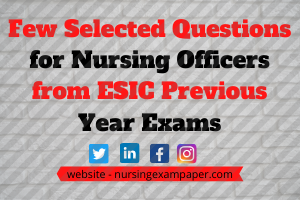


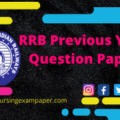

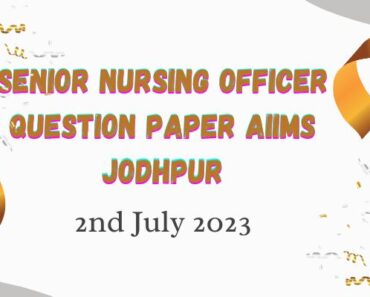
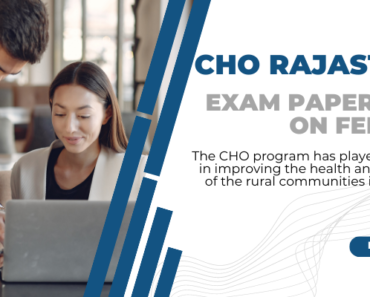

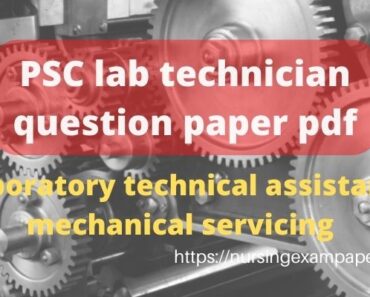
MORE QUESTION UPLOADED SIR